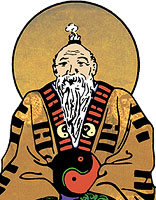
 |
|
Tao Te Ching Recordings
Music of the Dao De Jing. The publisher's description reads: "This superb 2-CD set adapts the text of the classic Tao Te Ching to music. The CDs contain over 140 minutes of fascinating music and the accompanying booklet features Chinese text and pinyin. For meditation or language learning, this disc is highly recommended." The chanting is in Chinese. The music is carefully and elaborately arranged, but for some reason didn't strike my ear as being very appealing. Still, this is a noble effort that may have interest for some. As of this writing, this recording is available from the China Books website. I'm not aware of any other distributors for it.Tai Hsuan Tao Foundation, Tao Teh Ching. This cassette tape provides a solo recitation of the following selected chapters from the Tao Te Ching: 1, 25, 28, 33, 40, 41, 42, 56, 62, 63, 64, and 76. On the first side, the chapters are chanted in extremely varied and piercing tones. This would not be easy to sing along with, and it's also a bit too raw for easy listening, but certainly earns marks for its intensity. One the second side, the same verses are spoken, which is very helpful for grasping the pronunciation. It's a shame that not all the chapters are included. There is also a companion book available with the Chinese text, transliterated text, and translation of these same chapters. I acquired this through the Tai Hsuan Foundation website. The site doesn't list their publications in detail, but if you call their phone number, they can let you know if the tape and book are still available.
Tao Te Ching Text
Daoism Depot.This website has a collection of Taoist scriptures online, which includes versions of the Tao Te Ching in the original Chinese, in PinYin transliteration, and in several different English translations. There are also audio clips of chapters 1, 40, 71, and 81 in spoken Chinese.
Chinese Cultural
Learning Center.
This website includes the Chinese,
transliterated, and translated text for the Tao Te Ching as well as
the Hundred Character Stele, selections from Chuang Tzu, and selections from
the I Ching. The version of the Tao Te Ching is arranged by theme rather
than in the traditional order. This makes for interesting reading and aids
comprehension of the philosophy.
Gate of All Marvelous Things : A Guide to Reading the Tao Te Ching,
by Gregory C. Richter. This is not really a guide, but an unusual
translation prepared for the needs of English-speaking students who are
studying the Chinese language. The text is included in Chinese, PinYin
transliteration, word-for-word translation, and flowing translation. The
preceding link goes to the description of the book on Amazon.com. The
translation is actually above average, and rather underrated by some of the
readers who commented on Amazon.
Some Lines to Contemplate
- Qing Jing Wei Tian Xia Zheng
- This line from Chapter 45 can be rendered as "When the mind is clear
and still, all things under heaven fall into place." At the webpage
called Dao
Notes: Part One, the commentator states: "This disarmingly simple
incantation is one of the most dense psycho/spiritual descriptions of
psychic reality ever articulated. The entire body of Taoist thought is an
elaboration of this elemental formula."
- Shuan Tsi Yow Shuan, Chun Miao Tsi Men
- As discussed elsewhere on this website, Ni Hua Ching describes these lines
from Chapter 1 as "Lao Tzu's invocation." See Invocations
from Ni, Hua Ching.
- Wu Wei Er Wu Bu Wei
- Richter (see above) translates this line from Chapter 48 as "The Dao
Does Not Act, But There Is Nothing That It Does Not Achieve." It seems
a nice reminder of the Taoist doctrine of wu wei, or
"non-action," meaning figuratively "effortless action"
or "natural action" or "going with the flow" or
"ego-less action" or perhaps "acting from non-dual
awareness."
- Dao Zhe, Wan Wu Zhi Ao
- From Chapter 62: "The Dao is the Profound Mystery of All
Things," (trans. Richter). This is one of the most graceful evocations
I have seen of the sense of Oneness.
- Chang Sheng Jiu Shi Zhi Dao
- From Chapter 59: "This is the Dao of Long Life and Lasting Insight" (trans. Richter). Twin virtues that we could all use more of.
- Gu Shen Bu Si,
Shi Wei Xuan Pin.
Xuan Pin Zhi Men,
Shi Wei Tian Di Gen.
Mian Mian Ruo Cun,
Yong Zhi Bu Qin. - These lines constitute Chapter 6, which can be rendered as:
-
The valley spirit never dies;
It is called the mysterious female.
The gateway of the mysterious female
Is called the root of heaven and earth.- It is like a veil barely seen,
But if you use it, it never fails.
- The regular pattern of four-syllable lines lends itself to chanting to the melody for the "Incense Offering" and "Golden Light Invocation" from Kenneth Cohen's tape set on Taoism. See Chants from Kenneth Cohen.
- It is like a veil barely seen,
Return to Taoist Chant, Mantra, and Invocations
Send comments to jfm.baharna@gmail.com.
© Copyright 2003 by Joseph F. Morales

